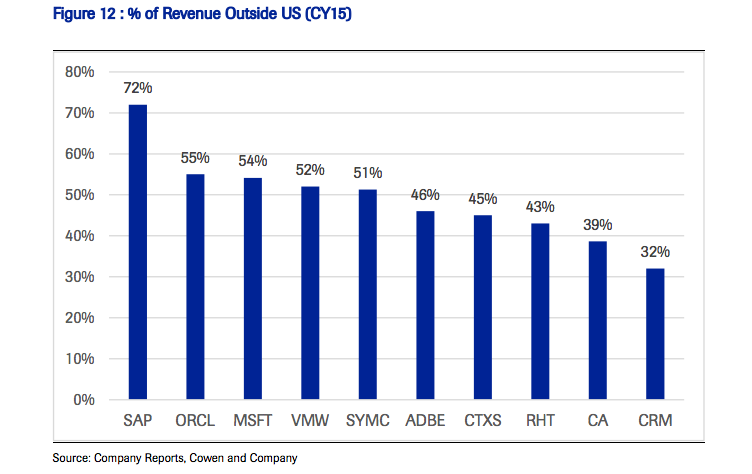
It feels like Amazon is taking over the world – they are buying Whole Foods, they are Gartner’s #1 IaaS provider, they are building a new cloud region in Hong Kong, and they managed to get Wal-mart so mad that the ol’ mart is banning suppliers from doing business with AWS.
I guess it’s good to be the king?
Red Hat is thinking about the future as they grow their services business while Oracle beat market expectations and had quite the stock rally.
Acquisitions
- Amazon to Buy Whole Foods for $13.7 Billion
Amazon.com Inc. said on Friday it would buy Whole Foods Market Inc. for $13.7 billion, including debt, instantly transforming the online giant into a major player in the bricks-and-mortar retail sector it has spent years upending.
The acquisition, Amazon’s largest by far, gives it a network of more than 460 stores that could serve as beachheads for in-store pickup and its distribution network. It would make Amazon an overnight heavyweight in the all-important grocery business, a major spending segment in which it has struggled to gain a foothold because consumers still largely prefer to shop for food in stores.
- Tokyo Takes Lead in Toshiba Chip-Unit Sale Over China Fears
The Japanese government-led group wasn’t the highest bidder, according to people briefed on the bids. Taiwan-based iPhone assembler Foxconn Technology Group, formally known as Hon Hai Precision Industry Co. , was ready to offer more, but Japanese government officials said its large China operations raised the risk that technology would leak.
Toshiba said the Japanese government-led plan is the “best proposal, not only in terms of valuation, but also in respect to certainty of closing, retention of employees, and maintenance of sensitive technology within Japan.”
Artificial Intelligence
- SAP Ariba and IBM – Global Strategic Alliance to Deliver Cognitive Procurement Solutions
- Inside Microsoft’s AI Comeback
Indeed, Microsoft first rolled out its developer tools for bots in the spring of 2016, as did other large tech companies like Facebook. They were billed as a replacement for apps, and many stakeholders really wanted that to be the case. By last spring, most people used the same small group of apps on their smartphones; the promise of bots was that developers and brands could reach new users again, much like they could in the early days of mobile via the app store. But users didn’t play along. And the deep learning that enabled bots to perform the equivalent of magic was improving faster than a paradigm for how to use them could evolved. “Bots are like apps before the file menu existed,” says Cheng. She explains there isn’t a common set of commands, so users are confused about where to find them and how they work. “Web pages, for example, all have back buttons and they do searches. Conversational apps need those same primitives. You need to be like, ‘Okay, what are the five things that I can always do predictably?’” These understood rules are just starting to be determined.
Cloud
- Wal-Mart to Vendors: Get Off Amazon’s Cloud
Wal-Mart is telling some technology companies that if they want its business, they can’t run applications for the retailer on Amazon.com Inc.’s leading cloud-computing service, Amazon Web Services, several tech companies say.
Amazon’s rise as the dominant player in renting on-demand, web-based computing power and storage has put some competitors, such as Netflix Inc., in the unlikely position of relying on a corporate rival as they move to the cloud.
https://www.wsj.com/articles/wal-mart-to-vendors-get-off-amazons-cloud-1498037402
- As Amazon, Microsoft and Google Keep Taking Cloud Share, Rivals Are Learning to Specialize
But whereas Google was alone in the Challengers quadrant last year — everyone besides the big-3 was labeled a Niche Player — Alibaba Group (BABA) , IBM Corp. (IBM) and Oracle Corp. (ORCL) managed to break into the quadrant this year. Some of this may be due to a more lenient attitude towards ranking smaller players on Gartner’s part. But it also might say a thing or two about how each company has learned how to stand out.
IBM’s ranking appears to have gotten a boost from its efforts to create a next-gen cloud infrastructure for enterprises that relies on proprietary IBM hardware and management software. Gartner also took note of IBM’s ability to use its global footprint to set up cloud data centers in 16 countries, and the potential to use its developer ecosystem to drive adoption of infrastructure services built on top of its Bluemix platform, which initially focused just on cloud app platform (PaaS) services for developers.
- Amazon announces new AWS Region in Hong Kong
Amazon announces plans to open an Amazon Web Services Region in Hong Kong next year to make the eighth AWS Region in Asia Pacific.
https://www.investing.com/news/stock-market-news/amazon-announces-new-aws-region-in-hong-kong-497816
- Oracle co-CEO Mark Hurd says you need these three things to transition to the cloud
“We historically used to write big contracts,” Hurd gave as an example. “Now we’re going to do a contract with a company that’s a startup. We’re going to go contract with Lyft for financials, but Lyft doesn’t have a procurement department. They don’t have even an IT department, per se. We can’t show up with a bunch of lawyers and a big, thick document. So we changed our process to go to ‘click to accept.’”
“That single decision, around here, is like, ‘You’ve got to be kidding,’” he added. “It’s just the way we’ve been trained, it’s what’s in our DNA.”
Datacenter/Hardware
- Taiwan’s Foxconn Eyes Seven States for $10 Billion Investment
In his remarks, Mr. Gou said Foxconn is considering roughly five states for potential investments, but a company executive later clarified that to say that seven states are candidates: Illinois, Indiana, Michigan, Ohio, Pennsylvania, Texas and Wisconsin. Foxconn will work together with Sharp Corp., the Japanese electronics maker acquired by Foxconn last year, on the U.S. plants, he said.
https://www.wsj.com/articles/foxconn-in-talks-with-u-s-states-over-new-plant-1498105489
Other
- Microsoft says “fireball” threat overblown
Today, Microsoft countered Check Point’s initial analysis that 250 million computers and 20 percent of corporate networks were infected with Fireball.
“While the threat is real, the reported magnitude of its reach might have been overblown,” said Hamish O’Dea of the Windows Defender research team. Check Point said today that it has been working with Microsoft since being notified of the new analysis.
“We tried to reassess the number of infections, and from recent data we know for sure that numbers are at least 40 million, but could be much more,” said Maya Horowitz, Group Manager, Check Point Threat Intelligence.
https://threatpost.com/microsoft-says-fireball-threat-overblown/126472/
- Oracle leaps to record as cloud transition hits turning point
Oracle Corp. was late to the cloud revolution, allowing upstarts like Salesforce.com Inc. to find significant market share with software delivered over the internet, and has suffered while making an acquisition-fueled push into the space.
The Band-Aid appears to have come off Oracle’s wound, however, and the company seems assured that its healed finances will be better than ever. Investors showed belief after Oracle’s fiscal fourth-quarter earnings report Wednesday evening, sending shares that had never cracked $47 in regular trading, adjusted for splits, to more than $51 in after-hours action. If that move holds, Oracle would be worth more than $200 billion.
- Former EMC Chief Joe Tucci Is Joining This VC Firm
Joe Tucci, who left his long-time gig as chairman and CEO of EMC after selling the company to Dell, is now special adviser to 83North, an investment firm focusing on European and Israeli startups.
83North, formerly known as Greylock IL, has offices in London, New York, and Tel Aviv. It has backed startups including Hybris, the German e-commerce company bought by SAP in 2013, and Israeli storage startup ScaleIO, which EMC acquired the same year.
- Meg Whitman Cedes One of Her HPE Titles To This Exec
Hewlett-Packard Enterprise has promoted a 22-year veteran of the company to president. The move comes as HPE continues to sort out its businesses after a series of acquisitions, divestitures, and layoffs.
The new president, Antonio Neri, was most recently executive vice president and general manager of HPE’s Enterprise group, which sells data center servers, storage, networking to corporate customers.
http://fortune.com/2017/06/21/meg-whitman-names-new-hpe-president/
- Red Hat’s comeback rolls on, thanks to a surging application development business
The Raleigh, North Carolina-based company actually quickened growth in sales of subscriptions for application development tools from the pace it set in its fiscal first quarter. Application development-related and other emerging technology subscription revenues were $139 million, up 41 percent year-over-year and slightly above the previous quarter’s 40 percent growth pace. Subscription revenue for Red Hat’s core infrastructure business rose 14 percent, to $458 million, an impressive gain on top of an already large base.
Chief Executive Jim Whitehurst said Red Hat is shifting its business from being a low-cost provider of open-source alternative software to a strategic platform for cloud migration. “We’ve moved from having a seat the table with the purchasing department to having a seat at the table with the CIO,” he said. Sales of core infrastructure platforms like Red Hat Enterprise Linux and OpenStack, he added, “provides a tailwind for our other offerings.”
Photo: Benjamin Davies













